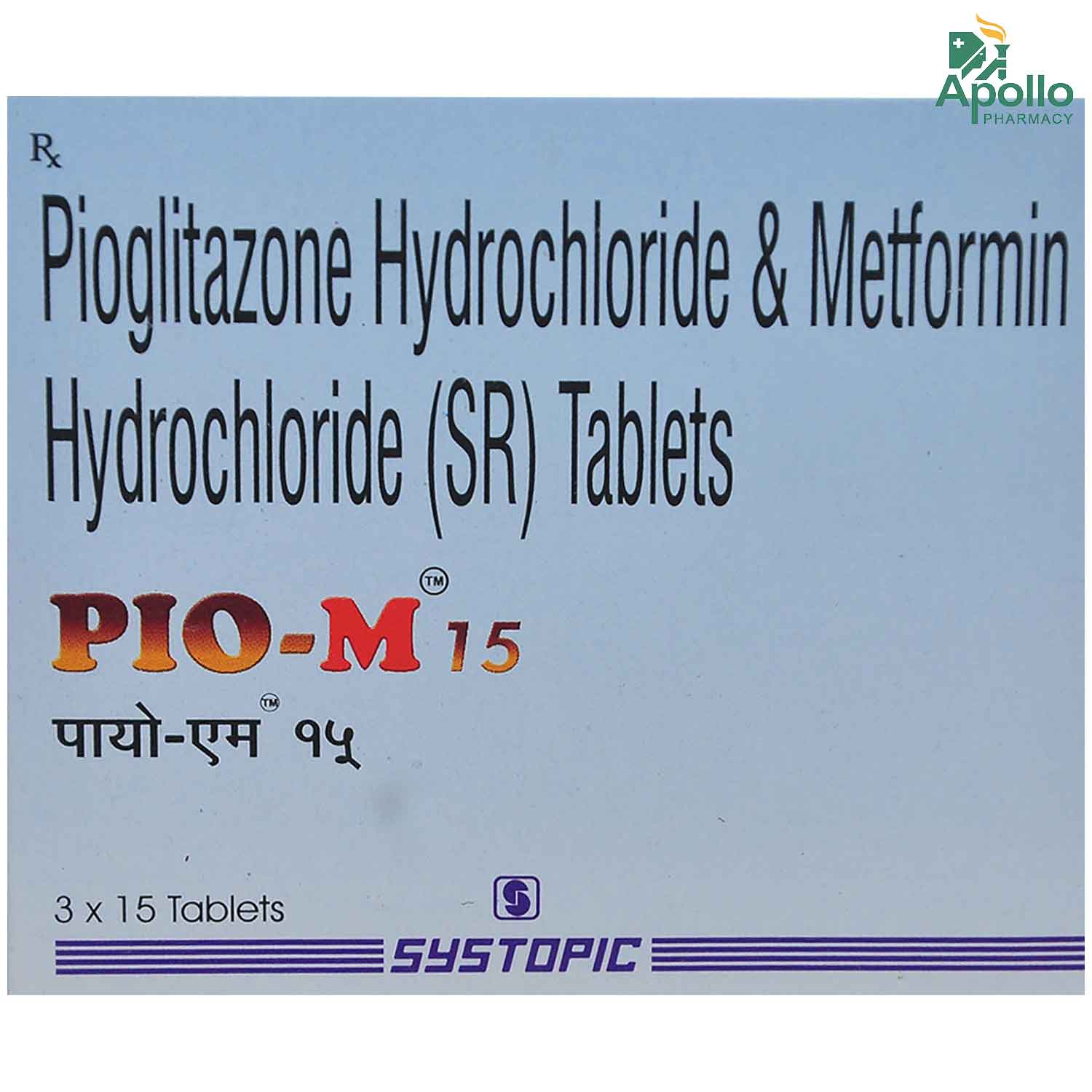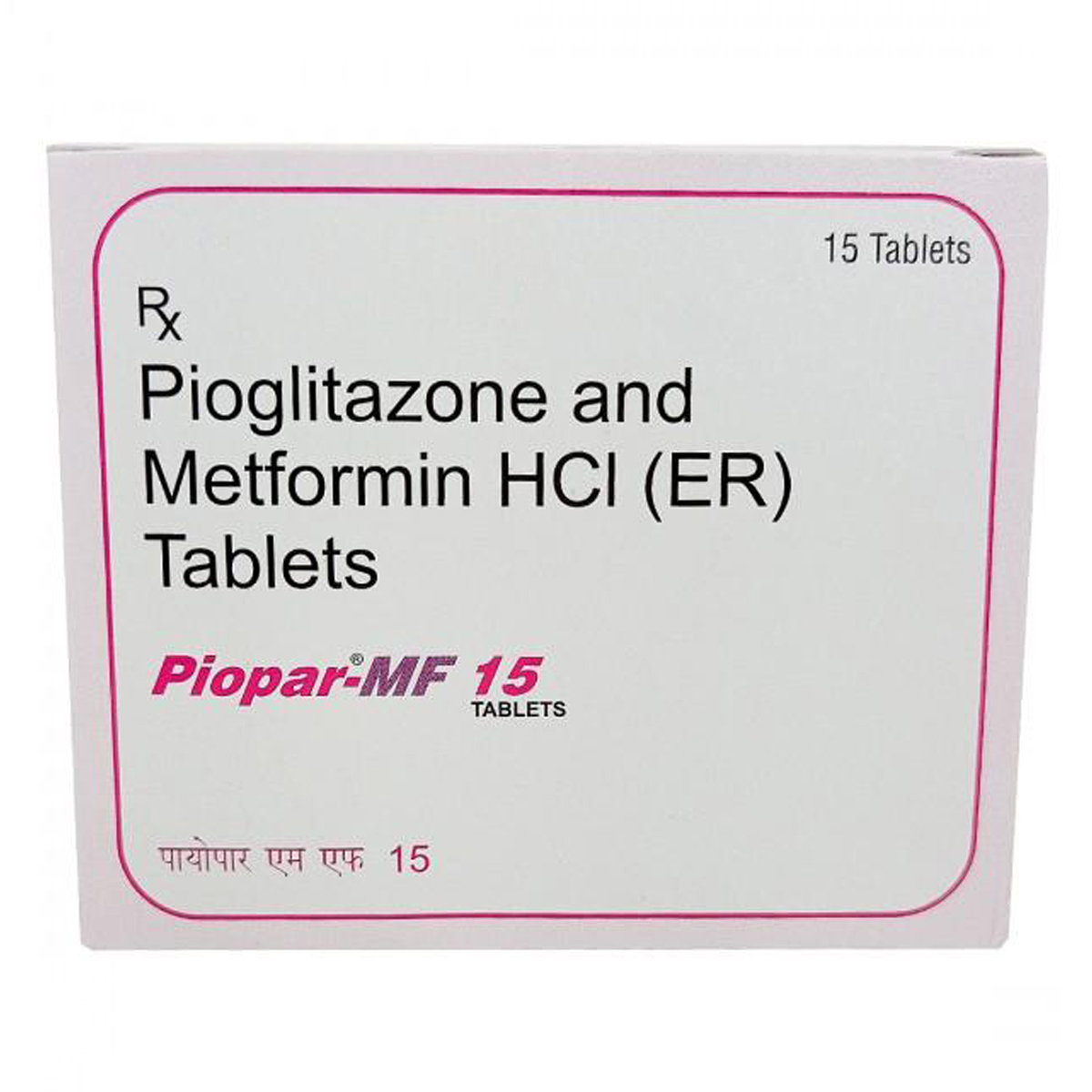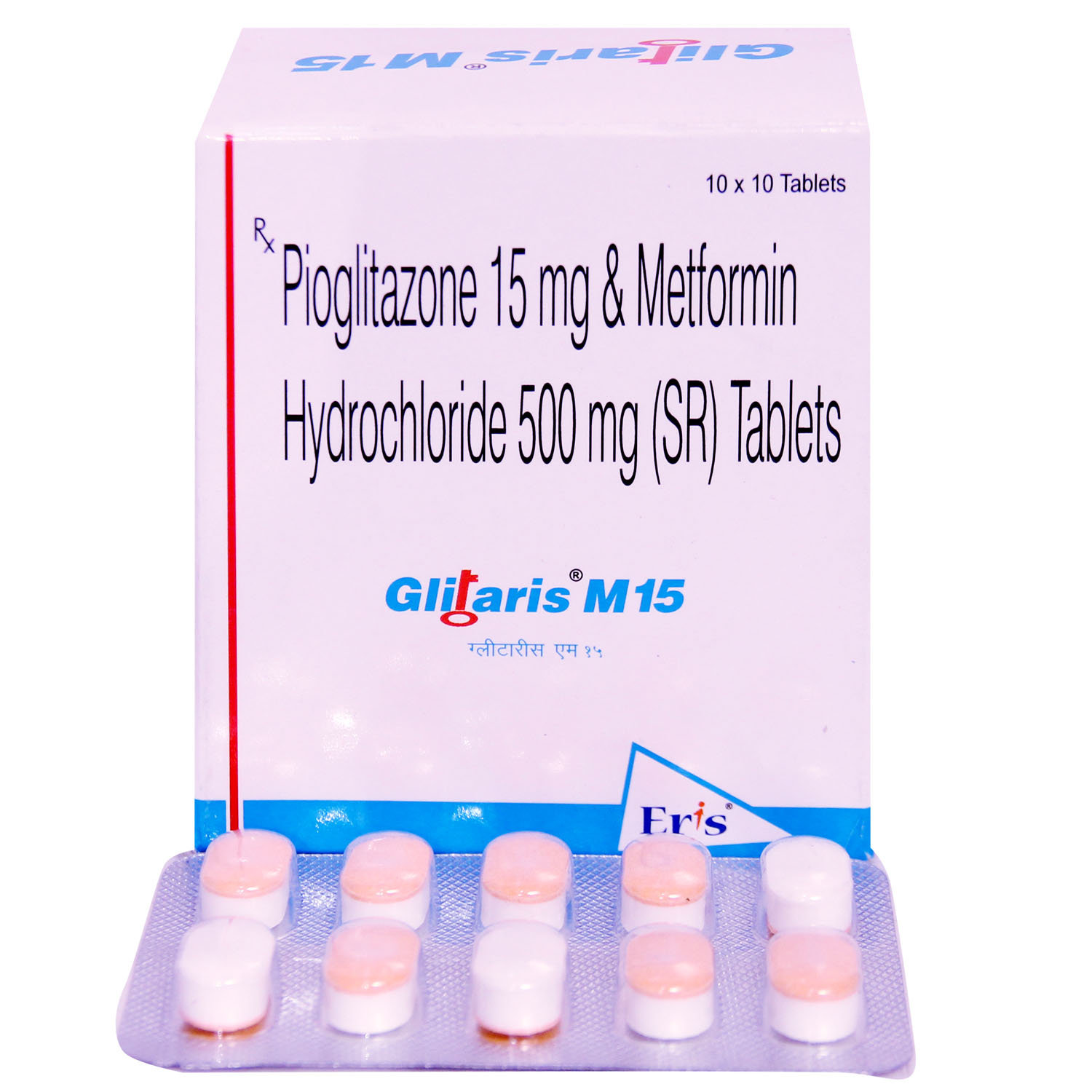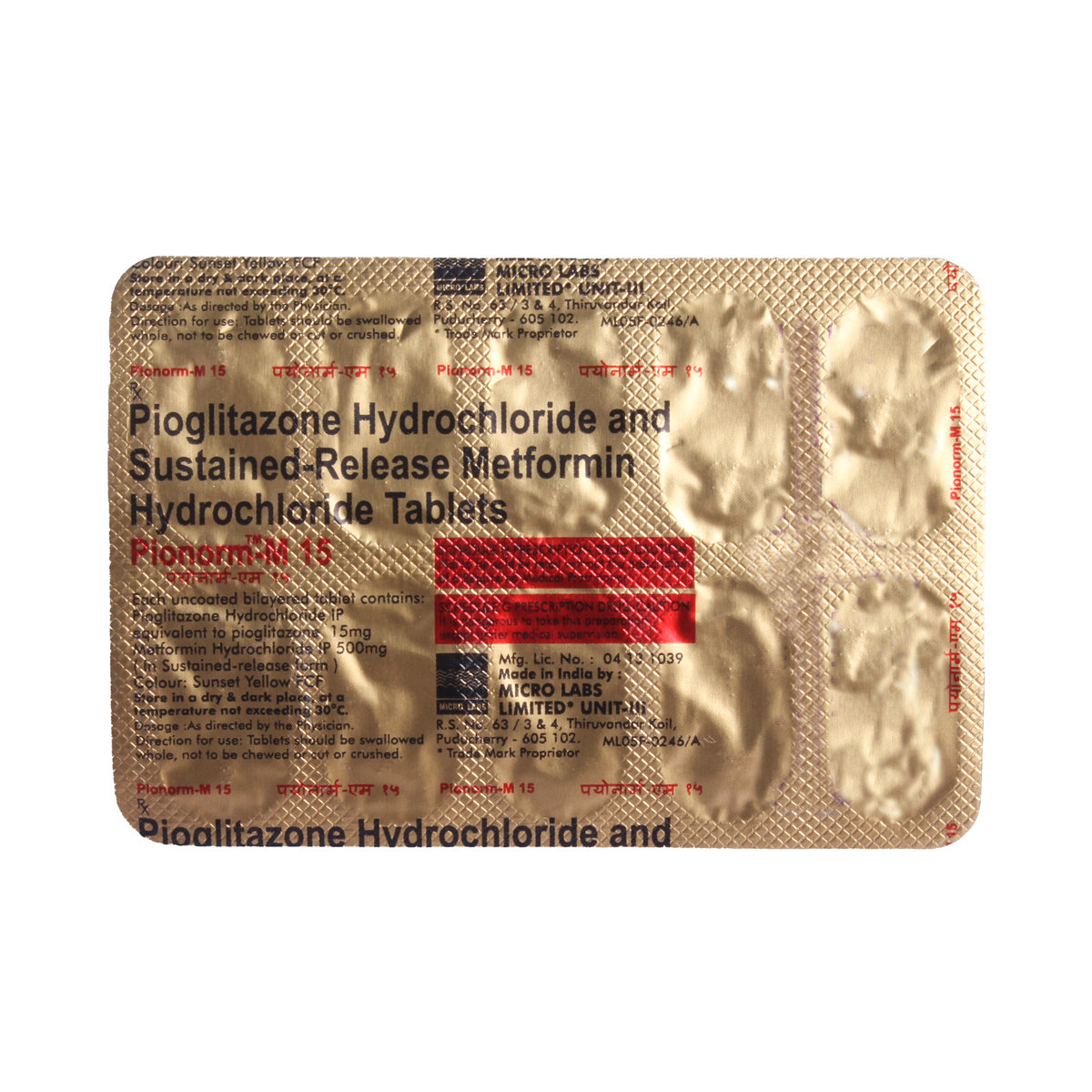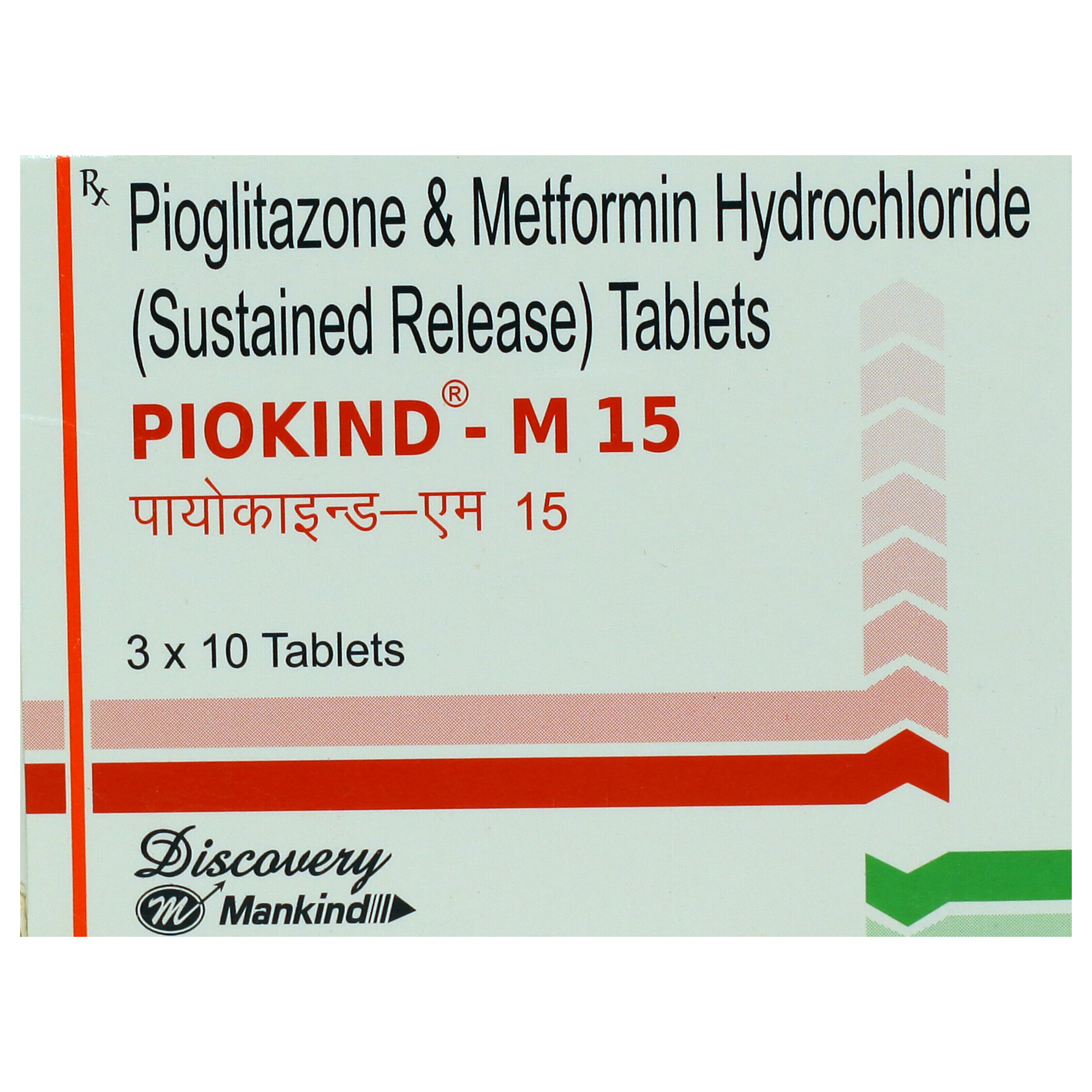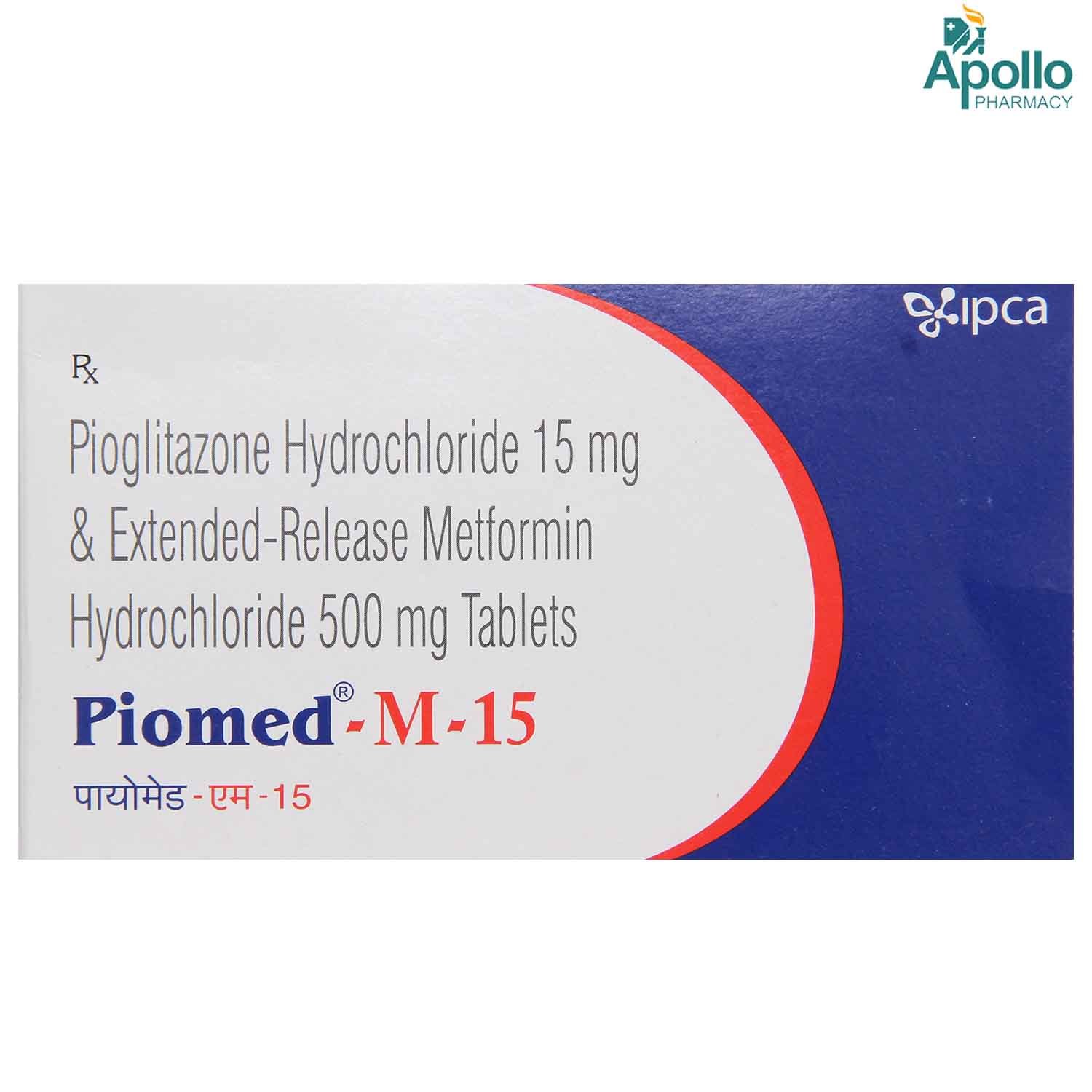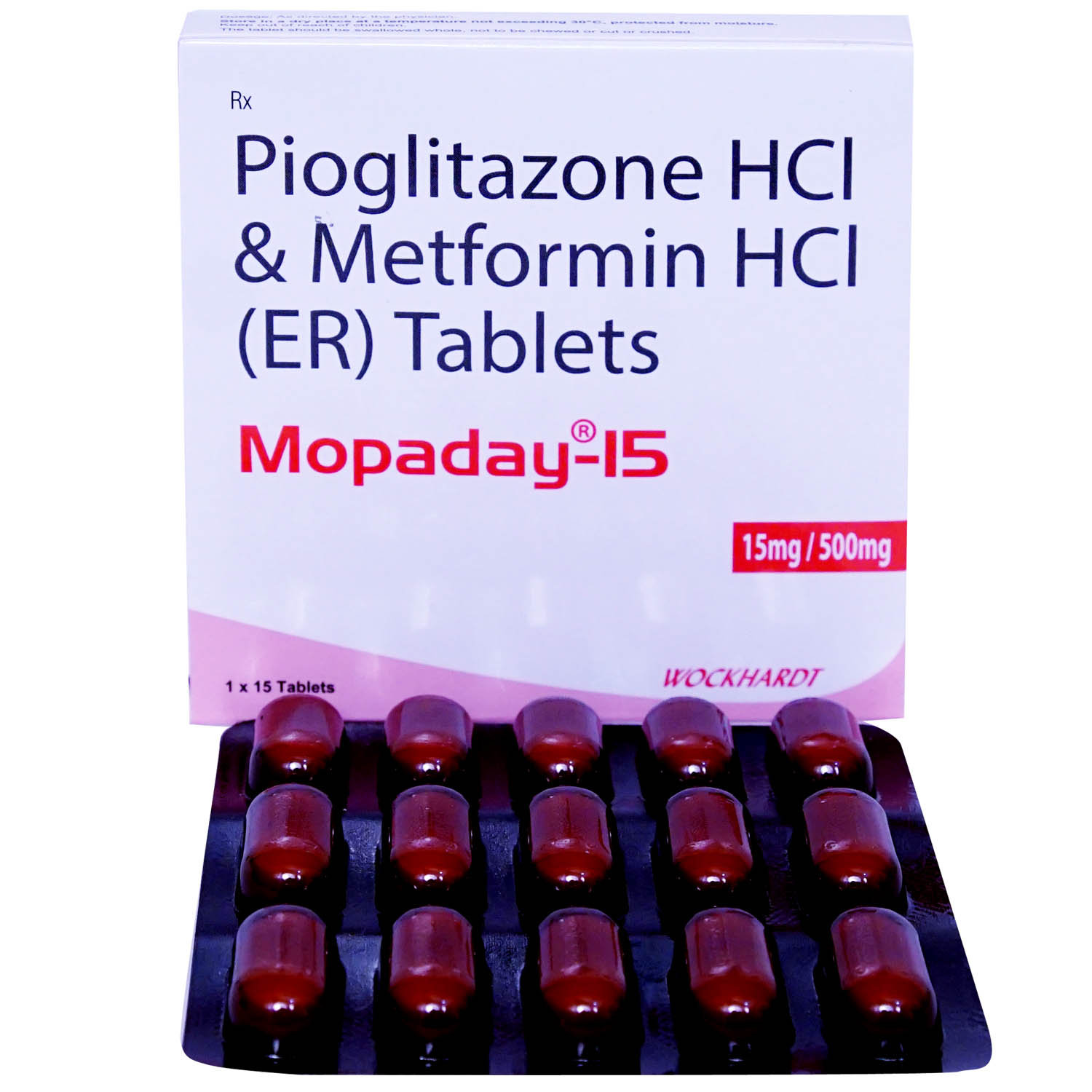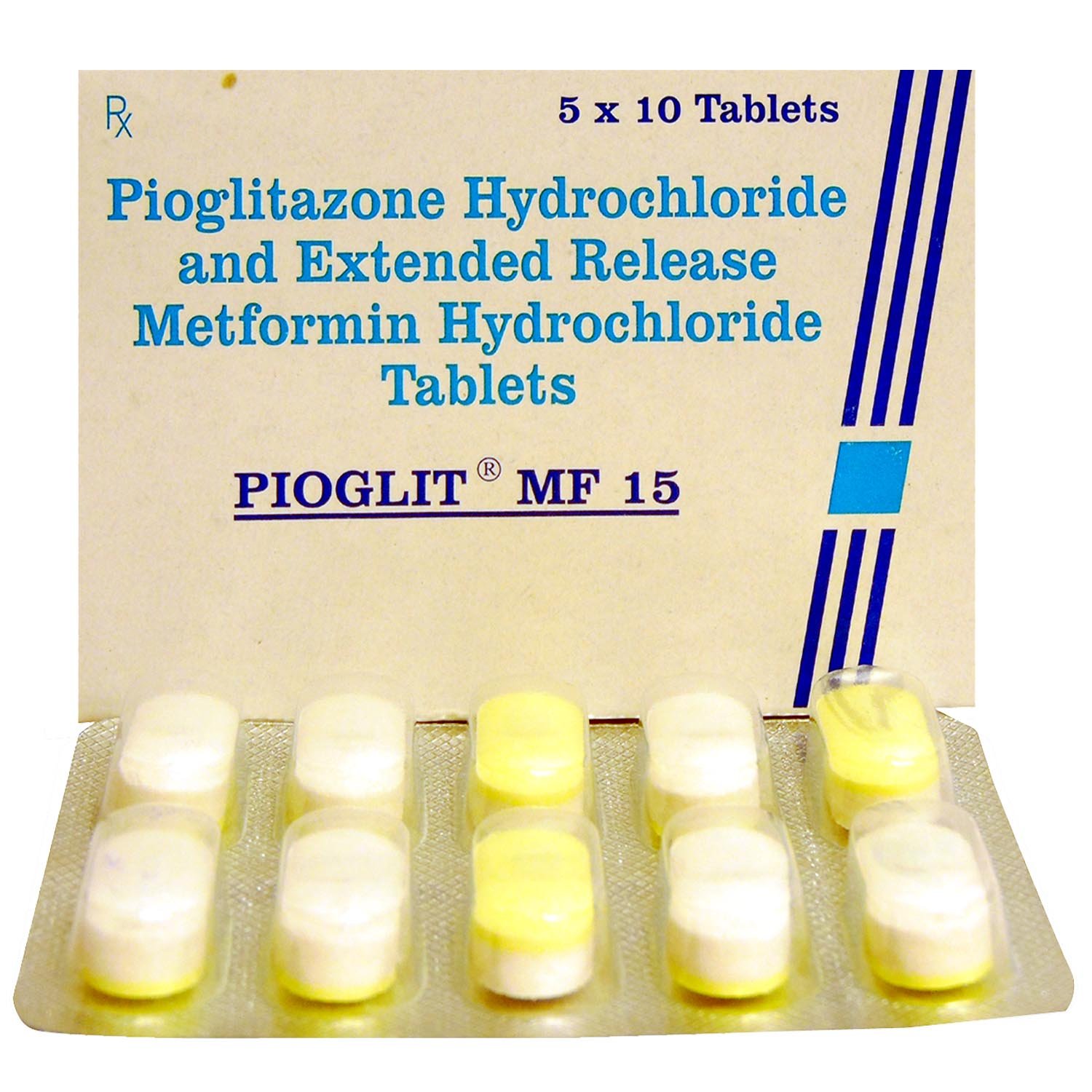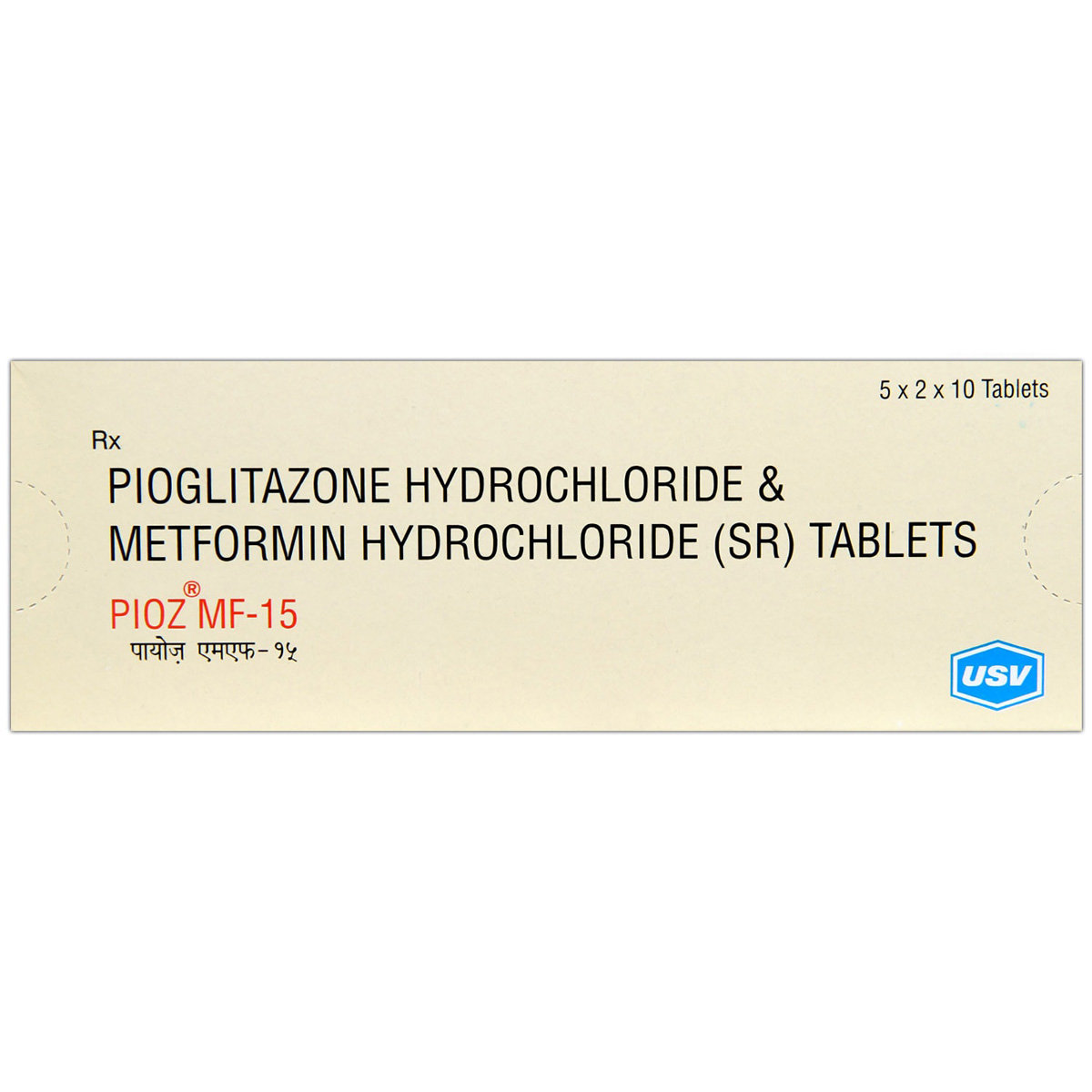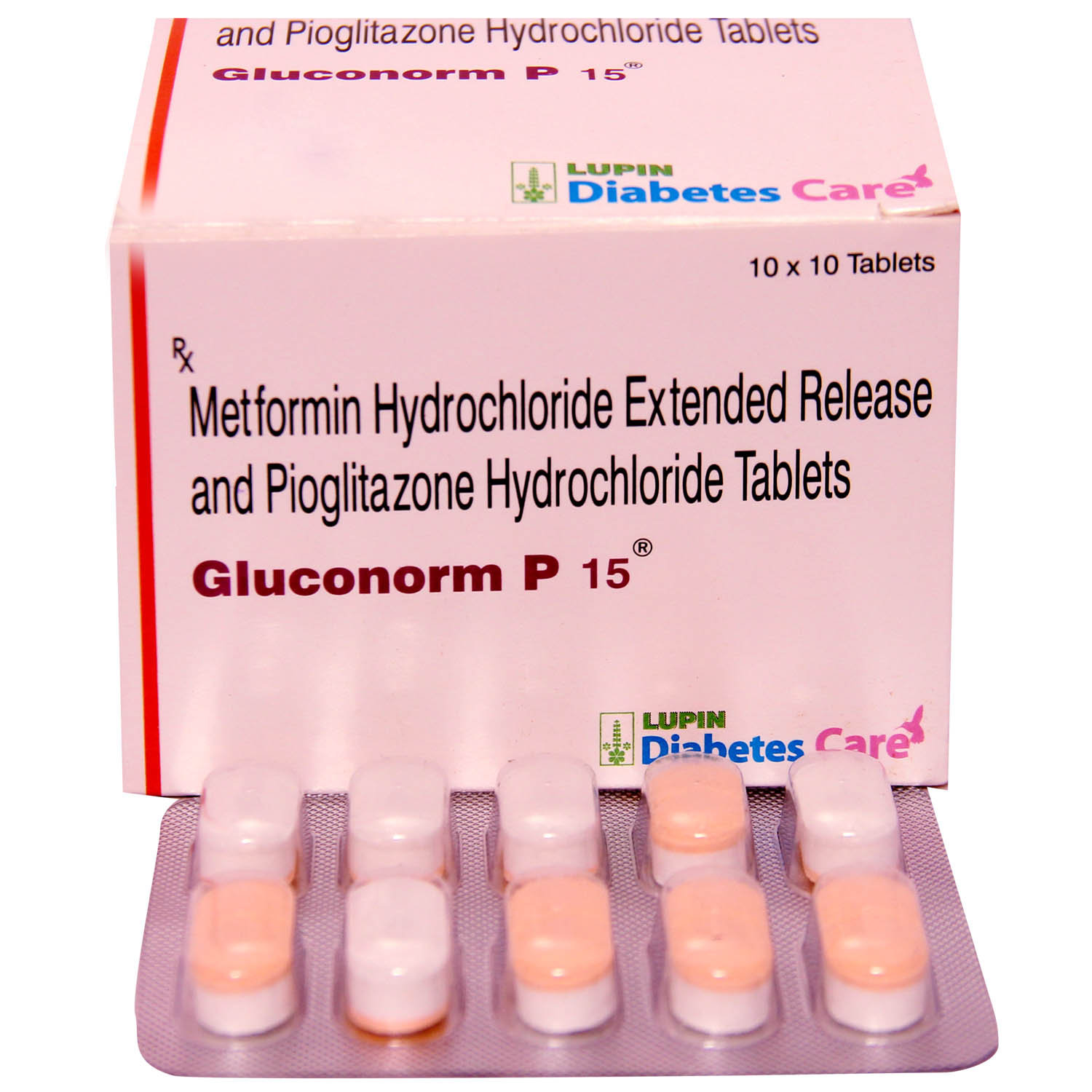- Home
- Glyciphage-P15 Tablet
Glyciphage-P15 Tablet Substitute
Glyciphage-P15 Tablet Substitute
Medicine Composition:
METFORMIN-500MG + PIOGLITAZONE-15MGAll Substitutes & Brand Comparisons
RX
Pio M 15 Tablet 15's
Systopic Laboratories Pvt Ltd
₹70
(₹4.2 per unit)
53% CHEAPERRX
Glitanir M Tablet 10's
Nirvana India Pvt Ltd
₹59
(₹5.31 per unit)
41% CHEAPERRX
Piohope-M 15/500 mg Tablet 10's
Mankind Pharma Pvt Ltd
₹64.5
(₹5.81 per unit)
35% CHEAPERRX
Piopar-MF 15 mg/500 mg Tablet 15's
Vaks Pharma Pvt Ltd
₹132.5
(₹7.95 per unit)
11% CHEAPERRX
Mysensi-M Tablet 10's
Daylon healthcare pvt Ltd
₹92.5
(₹8.33 per unit)
7% CHEAPERRX
Glitaris M 15 Tablet 10's
Eris Life Sciences Ltd
₹100
(₹9.0 per unit)
RX
Pionorm-M 15 Tablet 10's
Micro Labs Ltd
₹102
(₹9.18 per unit)
1% COSTLIERRX
Piokind M 15 Tablet 10's
Mankind Pharma Pvt Ltd
₹104
(₹9.37 per unit)
4% COSTLIERRX
Piorun-M Tablet 10's
Jarun Pharmaceuticals Pvt Ltd
₹105
(₹9.46 per unit)
5% COSTLIERRX
Piomed M 15 Tablet 10's
Ipca Laboratories Ltd
₹121.5
(₹10.94 per unit)
21% COSTLIERRX
Mopaday 15 Tablet 15's
Wockhardt Ltd
₹193.5
(₹11.61 per unit)
28% COSTLIERRX
Piopod MF 15 Tablet 10's
Torrent Pharmaceuticals Ltd
₹129.5
(₹11.66 per unit)
29% COSTLIERRX
Pioglit MF 15 Tablet 10's
Sun Pharmaceutical Industries Ltd
₹143
(₹12.88 per unit)
43% COSTLIERRX
Pioz MF-15 Tablet 10's
USV Pvt Ltd
₹145.5
(₹13.1 per unit)
45% COSTLIERRX
Gluconorm P 15 Tablet 10's
Lupin Ltd
₹152.5
(₹13.73 per unit)
52% COSTLIER

When Should You Consider Switching from Glyciphage-P15 Tablet ?
Patients may explore substitutes in the following scenarios:
- High monthly cost of Glyciphage-P15 Tablet
- Non-availability in local pharmacies
- Generic recommendation by a doctor
- Side effects or better tolerability with alternatives
What to Know Before Switching
Before you switch from Glyciphage-P15 Tablet to another medicine, here are some important points to keep in mind:
Same salt, different brands:
Most substitutes contain the same active ingredient - METFORMIN-500MG + PIOGLITAZONE-15MG, but the fillers, coating, or manufacturing quality may vary slightly.
Consult your doctor first:
Even if the salt is the same, your doctor can confirm if the substitute is right for your condition, dosage, and health history.
Watch out for allergies or reactions:
Some people may react differently to certain brands due to inactive ingredients. If you notice any side effects, inform your doctor immediately.
Price ≠ effectiveness:
A lower-priced substitute doesn't mean it's less effective. Many generic medicines work just as well as branded ones.
Check the dosage form and strength:
Always match the substitute’s strength (e.g., 5mg, 10mg) and form (tablet, capsule, syrup) with what your doctor prescribed.
Uses
Glyciphage-P15 Tablet is used in the treatment of type 2 diabetes. The detailed uses of Glyciphage-P15 Tablet are as follows:
- Improves blood sugar control: Glyciphage-P15 Tablet works by helping the body utilise insulin more effectively and reducing the amount of sugar produced by the liver, resulting in improved blood sugar levels.
- Supports Insulin Sensitivity: Glyciphage-P15 Tablet helps the body’s cells become more responsive to insulin, aiding in the effective management of type 2 diabetes.
- Reduces risk of diabetes complications: By keeping blood sugar levels in check, Glyciphage-P15 Tablet helps lower the chances of problems like kidney disease, nerve damage, and vision issues.
Medicinal Benefits
- Glyciphage-P15 Tablet is used in adults to treat type 2 (non-insulin-dependent) diabetes mellitus when treatment with metformin alone is not sufficient.
- Glyciphage-P15 Tablet plays a vital role in controlling blood sugar levels and prevents serious complications of diabetes like eyesight loss (retinopathy), kidney (nephropathy), nerve damage (neuropathy), diabetic foot ulcer and delayed wound healing.
- Glyciphage-P15 Tablet lowers blood sugar by activating cell switches (PPAR) to take up free glucose from the blood and use it for energy production, and decreases the production of glucose inside the liver.
FAQs
The substitutes of Glyciphage-P15 Tablet contain the same active salt(s) - METFORMIN-500MG + PIOGLITAZONE-15MG. However, they may differ in price, manufacturing quality, and inactive ingredients. Speak to your doctor to find a suitable option.
Switching to a generic substitute medicine in the place of Glyciphage-P15 Tablet is often possible if it has the same salt, strength, and dosage form. But always check with your doctor before making any changes to your medication.
Generics versions of Glyciphage-P15 Tablet are typically more affordable because they don’t include the original brand's research, development, and marketing costs. They contain the same active ingredient and are approved for safety and effectiveness.
Most people don’t notice any difference. However, some may react to different fillers or coatings. If you notice any unusual symptoms after switching, consult your doctor.
Make sure the new medicine has the same active salt, strength, dosage form. Always confirm the change with your doctor or pharmacist.
Substitutes of Glyciphage-P15 Tablet meet the same safety and efficacy standards as Glyciphage-P15 Tablet , but small differences in absorption or formulation can exist. A doctor can help you choose the right one for your needs.
Yes. Substitutes of Glyciphage-P15 Tablet may vary in color, size, or shape due to differences in manufacturing and branding, but this does not affect how they work.
Yes, it’s generally safe to switch between multiple substitutes of Glyciphage-P15 Tablet if they have the same salt and strength. However, always inform your doctor so they can monitor how your body responds.
Yes, many people safely use substitutes of Glyciphage-P15 Tablet for long-term treatment. Just ensure it’s done under medical supervision.
If your symptoms stay under control or lab results remain stable, the substitute for Glyciphage-P15 Tablet is likely working well. Regular follow-ups with your doctor are important.
Absolutely. Even with the same salt, small differences can affect how your body responds when switching from Glyciphage-P15 Tablet to its substitute. Always consult your doctor before switching.
Glyciphage-P15 Tablet is used to treat Type II diabetes (non-insulin-dependent diabetes). It lowers blood sugar by activating cell switches (PPAR) to take up free glucose from the blood and use it for energy production. It also decreases the production of glucose in the liver.
Glyciphage-P15 Tablet can cause fluid retention, which can cause heart failure. The doctor usually recommends starting from a lower dose and increasing the dose slowly while treating patients who are at risk of heart failure. Heart failure is reported mainly in patients taking insulin Glyciphage-P15 Tablet simultaneously.
There have been rare cases of liver damage in patients taking Glyciphage-P15 Tablet . The doctor usually screens the patient continuously during the course of treatment with Glyciphage-P15 Tablet . A patient is advised to visit a doctor strictly as per the doctor's advice.
Glyciphage-P15 Tablet is contradictory when used in patients with high blood pressure. A doctor's consultation is required before taking this drug in a patient with high blood pressure.
Glyciphage-P15 Tablet is safe to take before driving a vehicle or operating machinery, provided blood sugar levels are stable. However, a patient is advised to take proper precautions and make sure that Glyciphage-P15 Tablet is not taken with another blood sugar-lowering agent.
Not recommended to be taken with contraceptives. Glyciphage-P15 Tablet decreases the activity of oral contraceptives like Ethinyl estradiol by almost 30% and leads to failure of contraception.
Type 2 diabetes is a condition where the body is unable to produce sufficient insulin, or the insulin it produces doesn't work correctly or is not utilised by the body. This can cause high blood sugar levels (hyperglycemia). Symptoms of type 2 diabetes include increased thirst, frequent urination, slow, increased hunger, fatigue, and blurred vision.
Glyciphage-P15 Tablet should be swallowed as a whole with a glass of water. Avoid crushing, chewing, or breaking it.
Don't stop taking Glyciphage-P15 Tablet without consulting your doctor, even if your blood sugar levels return to normal. Stopping the medication suddenly can cause your blood sugar levels to fluctuate, leading to potential complications. Your doctor prescribed Glyciphage-P15 Tablet to help manage your type 2 diabetes, and they need to assess your condition before making any changes to your treatment plan. Consult your doctor before stopping or adjusting your medication, as they will provide personalised guidance to ensure your blood sugar levels remain stable and under control.
Avoid or limit alcohol consumption while taking Glyciphage-P15 Tablet , as it can interact with the medication and increase the risk of low or high blood sugar levels, as well as a rare but serious condition called lactic acidosis. Additionally, alcohol can worsen certain health conditions, such as nerve damage or liver disease. If you do choose to drink alcohol, do so in moderation and closely monitor your blood sugar levels.
Common side effects of Glyciphage-P15 Tablet may include stomach aches, feeling sick (nausea), vomiting, diarrhoea, loss of appetite, localised swelling (oedema), weight gain, headache, respiratory infection, numbness, taste disturbance, etc. Most of these side effects of Glyciphage-P15 Tablet do not require medical attention and typically resolve on their own over time. However, if the side effects persist or worsen, please consult your doctor.
To make an informed decision, consult your healthcare professional, who can assess your individual situation and provide personalised guidance on using Glyciphage-P15 Tablet while breastfeeding.
Glyciphage-P15 Tablet should be taken with caution in patients with kidney disease. In rare cases, serious interactions have been found in kidney patients, called lactic acidosis; thus, a doctor's consultation is required before taking Glyciphage-P15 Tablet .
Glyciphage-P15 Tablet is recommended not to be used in children. Glyciphage-P15 Tablet is a medication typically prescribed for adults over 18 years with type 2 diabetes.
Glyciphage-P15 Tablet is not recommended during pregnancy as there is not much information about its safety during pregnancy. If you are pregnant or thinking of getting pregnant, talk to your doctor, as they will need to review your treatment. They can suggest a different medicine that is safer for you to take during pregnancy.
Store in a cool and dry place away from sunlight. Keep Glyciphage-P15 Tablet out of reach and out of sight to children.
No, Glyciphage-P15 Tablet is not indicated for treating type 1 diabetes. Glyciphage-P15 Tablet is a medication specifically designed to treat type 2 diabetes, and it's not suitable for managing type 1 diabetes.
Glyciphage-P15 Tablet can interact with various other drugs, including those used to manage diabetes, blood pressure, heart conditions, and thyroid disorders, as well as steroids and blood thinners. Always let your healthcare professional know about all the medications you are currently taking to reduce risks. They will help you navigate potential interactions and ensure safe treatment. Consulting your healthcare professional before combining Glyciphage-P15 Tablet with any other medications is key.
Glyciphage-P15 Tablet contains Pioglitazone (thiazolidinedione) & Metformin (biguanide).
Buy best Diabetics products by
Torrent Pharmaceuticals Ltd
Intas Pharmaceuticals Ltd
Eris Life Sciences Ltd
Micro Labs Ltd
Lupin Ltd
Sun Pharmaceutical Industries Ltd
Mankind Pharma Pvt Ltd
Alkem Laboratories Ltd
Lloyd Healthcare Pvt Ltd
Cipla Ltd
Macleods Pharmaceuticals Ltd
Abbott India Ltd
Primus Remedies Pvt Ltd
Glenmark Pharmaceuticals Ltd
Aristo Pharmaceuticals Pvt Ltd
Dr Reddy's Laboratories Ltd
USV Pvt Ltd
La Renon Healthcare Pvt Ltd
Wockhardt Ltd
Emcure Pharmaceuticals Ltd
Fusion Health Care Pvt Ltd
Ajanta Pharma Ltd
Ipca Laboratories Ltd
Corona Remedies Pvt Ltd
Alembic Pharmaceuticals Ltd
East West Pharma India Pvt Ltd
Hbc Life Sciences Pvt Ltd
Eswar Therapeutics Pvt Ltd
Zydus Healthcare Ltd
Alteus Biogenics Pvt Ltd
Elbrit Life Sciences Pvt Ltd
Medley Pharmaceuticals Ltd
Mitoch Pharma Pvt Ltd
Ranmarc Labs
Sinsan Pharmaceuticals Pvt Ltd
Verse Lifesciences
Msn Laboratories Pvt Ltd
Nirvana India Pvt Ltd
Tas Med India Pvt Ltd
Akumentis Healthcare Ltd
Arkas Pharma Pvt Ltd
Unison Pharmaceuticals Pvt Ltd
Leeford Healthcare Ltd
Sanofi India Ltd
Acmedix Pharma Llp
Q Check Pharmaceuticals
Blue Cross Laboratories Pvt Ltd
Neucure Lifesciences Pvt Ltd
Xemex Life Sciences
Anthem Bio Pharma
Spectra Therapeutics Pvt Ltd
Sydmen Life Sciences Pvt Ltd
Talent India Pvt Ltd
Aareen Healthcare Pvt Ltd
Alvio Pharmaceuticals Pvt Ltd
Diacardus Pharmacy Pvt Ltd
Edoc Life Sciences Pvt Ltd
Jubilant Lifesciences Ltd
Stature Life Sciences Pvt Ltd
Systopic Laboratories Pvt Ltd
Franco Indian Pharmaceuticals Pvt Ltd
Indoco Remedies Ltd
Panacea Biotec Ltd
Sanz Pharmaceuticals
Shrrishti Health Care Products Pvt Ltd
Akesiss Pharma Pvt Ltd
Hicxica Formulations Pvt Ltd
Lividus Pharmaceuticals Pvt Ltd
Novo Nordisk India Pvt Ltd
Capital Pharma
Elinor Pharmaceuticals (P) Ltd
Remedy Life Sciences Pvt Ltd
Saan Labs
Zydus Cadila
Biocon Ltd
Eli Lilly and Company (India) Pvt Ltd
Lippon Pharma Pvt Ltd
MERAKI HEALTH
Eysys Pharmaceutical Pvt Ltd
Koye Pharmaceuticals Pvt Ltd
Morepen Laboratories Ltd
Atos Lifesciences Pvt Ltd
Erinyle Health Care Pvt Ltd
LSD Pharmaceuticals
MEDICAMEN BIOTECH LTD
Azkka Pharmaceuticals Pvt Ltd
Converge Biotech Pvt Ltd
Knoll Healthcare Pvt Ltd
Elder Pharmaceuticals Ltd
FDC Ltd
Heal (India) Laboratories Pvt Ltd
Wallace Pharmaceuticals Pvt Ltd
Jarun Pharmaceuticals Pvt Ltd
Lincoln Pharmaceuticals Ltd
Opsis Care Lifesciences Pvt Ltd
Vasu Organics Pvt Ltd
Arica Pharmaceutical Pvt Ltd
CADOMAX HEALTHCARE PVT. LTD
Cadomed Pharmaceuticals India Pvt Ltd
Daylon healthcare pvt Ltd

